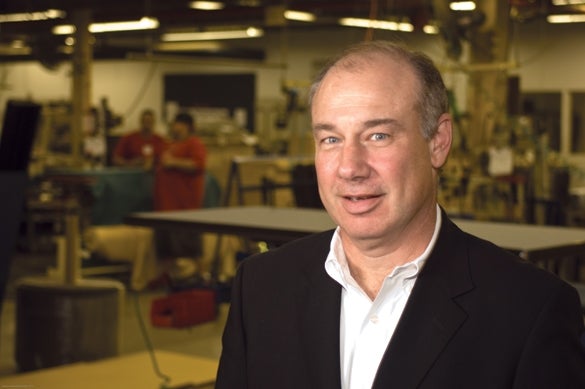It’s not what you might consider powerhouse homerun hitting.
Still, that’s not a bad thing, explained Bruce Platzman, CEO and president of the Hudson-based Affordable Interior Systems (AIS). The way he sees it, his company’s processes could be compared to consistent, reliable singles batting – or small victories.
And ultimately, “If you hit a lot of singles, you’re going to get a lot of runs,” he said.
Made In Massachusetts
Baseball analogies aside, though, AIS has been on a steady uphill climb. The company, which boasts 385 employees and manufactures its own brand of office workstations, has grown by 35 percent in the past three years, with a compounded expansion rate of 28 percent since its inception 18 years ago.
And all this despite the common mentality that “it can’t be done in Massachusetts.”
“Every single year we’ve turned a very sizeable profit, really in the face of what people tell us we can’t do,” said Platzman, who has nearly 30 years of experience in the furniture industry. “We’ve never had a year where we haven’t grown.”
There are distinct reasons for that. Chief among them: The company’s rugged, diverse product line, competitive pricing, quick turnaround times and intimate relationships with customers.
Platzman also described AIS’ staff as hard-working and creative, with a “can do” attitude. It’s about “just not ever saying no,” he said. “If I had to sum it up, it’s this: Deliver on what you promise. If you do, you’ll get repeat business, day-in, day-out.”
Recently, AIS has wrangled several large projects. For instance, its scored contracts to provide 500 cubicles for the Green Zone in Iraq within the past two years and, just after 9/11, 2,300 workstations for the Pentagon.
All told, the company works with 600 dealers, supplying cubicles to the United States and Middle East, Dubai, Canada, Mexico and Latin America.
In some cases, beefing up that cache has required meeting selective criteria.
Care For Quality
Take Peabody Office Furniture Corp. in Boston, which has worked with AIS as a dealer of its products for six years. According to president and CEO Richard Vaughn, his company interviews potential partners and doesn’t take any on unless they have a philosophy of providing high-quality products that they stand behind — which many manufacturers might say but don’t always practice.
Altogether, Peabody has relationships with 150 vendors, and AIS ranks in the top five. “It is a very consistent performer,” said Vaughn.
Such reliability — as well as quick turnarounds — can largely be credited to the company’s “less mess” philosophy, said Platzman.
For some time, AIS has observed the Japanese axiom of “Kaizen,” which translates to “continuous improvement.” Ultimately, the goal is to reduce waste and streamline operations. For example: With panel manufacturing, the amount of materials can be reduced and the process can be sped up by eliminating jerk-stops and by also providing workers with all the tools they need in their immediate vicinity.
Since adopting the philosophy, the company has come up with 110 cost-saving ideas — many of which are depicted in a gallery of 200 photos. As an incentive, any employee who proposes a Kaizen idea receives $100.
Ultimately, AIS started out of the gate with a conservative mindset — in fact, it was a founding quality. The company began in 1990 as a seller of used and re-manufactured furniture, and within three years became the largest re-manufacturer in the industry. By 1996, however, it had outgrown that enterprise — there weren’t as many materials coming in as they required — and it began manufacturing workstations.
Today, everything is custom made, with metal components outsourced to fabricators across the state and overseas that collectively use $20 million of AIS’ tooling equipment. The cubicles range from utilitarian — including a desk, chair, shelves and three walls — to complex, with built-in data and communication capabilities.
Variety will continue to be key into the future, said Platzman; quick turnarounds and competitive prices will be other essentials in the difficult economic times ahead. Overall, Platzman said he is confident that the company will persist with its growth, as it has weathered and even prospered in past bleak periods.
However, as is the case with many people, “We’re concerned about how dramatic this downturn’s going to be,” said Platzman. “There is business out there, but it’s going to be even more cost-conscious.”
Taryn Plumb is a freelance writer based in Worcester.

